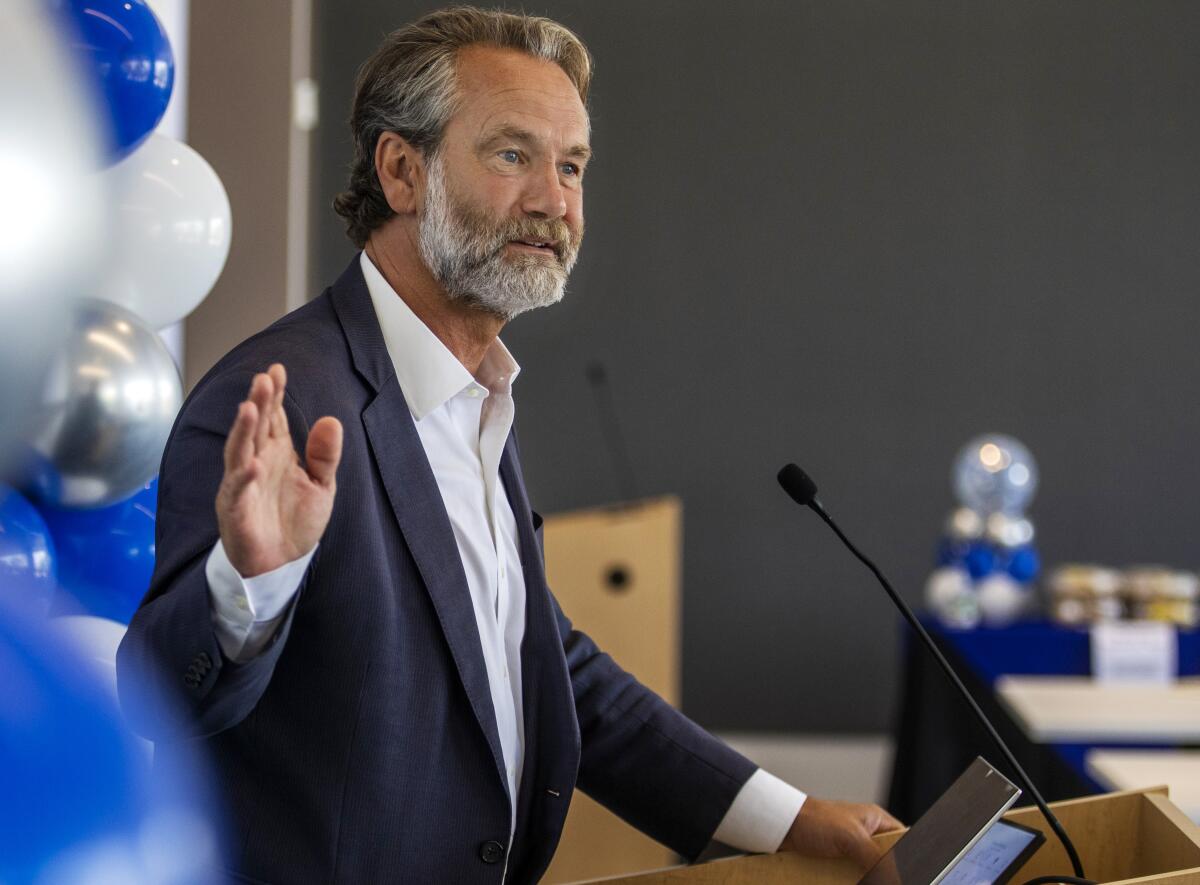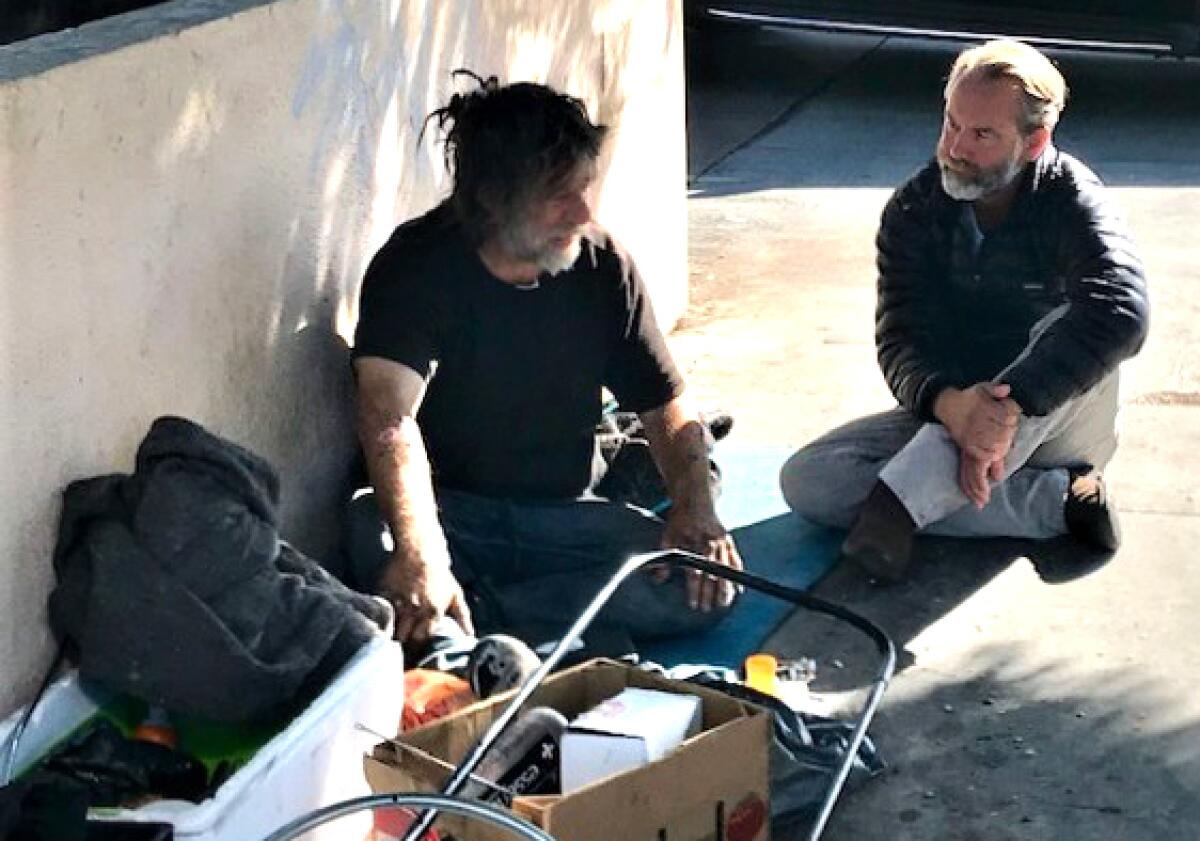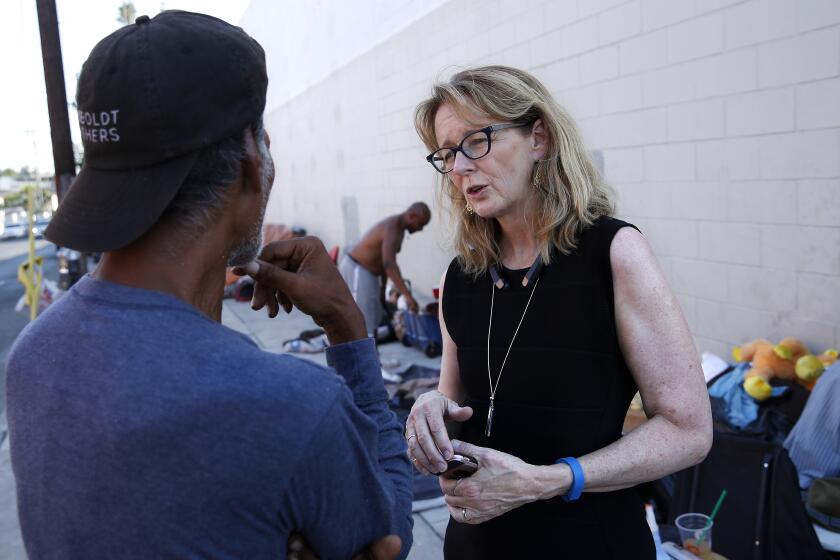Long after L.A.’s mental health chief quit, pressures he faced still shape the agency

- Share via
A 2017 trip to observe a celebrated Italian mental health system made believers out of a group of Los Angeles County and nonprofit leaders.
Treatment in the city of Trieste targeted the whole person — not just the illness — and services were available around the clock. Psychiatrists made house calls, families were deeply involved with care, and no one sat in trash in front of storefronts.
The visiting officials were so united in their mission to import the model to Los Angeles, they called themselves the “Tribe.”
But relations strained as the purity of the idea collided with real-world challenges. Solidarity morphed into finger pointing. Six years after the original visit, and four years after the state awarded $116 million to launch a Trieste-inspired pilot program in Hollywood, not a single dollar has hit the streets. The project, yet to launch, is under revision.
Dr. Jonathan Sherin, the director of Los Angeles County’s Department of Mental Health at the time, was a charter member of the Tribe. Shortly before stepping down as head of the department on July 1, he expressed exhaustion from attacks over the project and the inflexibility of former collaborators he described as purists sitting on the sidelines.
Dr. Jonathan Sherin said he made the decision after “a serious health scare ... and weeks of subsequent soul searching.”
“It’s easy to be in the peanut gallery,” Sherin said. “Come into the cauldron.”
The stalled Trieste plan stands as a potent example of the opposing forces pulling on the nation’s largest mental health agency, where expansive vision frequently runs up against the daily reality that even its $3-billion budget is heavily constrained and tested by overwhelming caseloads and a vast bureaucracy.
Those pressures play into the county’s decision about who will replace Sherin. Many officials, including Sherin, back Interim Director Lisa Wong, a 30-year veteran of the agency, and support her eventually getting the post on a permanent basis. Whoever does, however, will face many of the same dilemmas Sherin confronted.
When county officials appointed Sherin, 57, to the job in 2016, he was hailed as a visionary.
As a student, Sherin planned to become a neurosurgeon. But during his fourth year of medical school at the University of Chicago, he enrolled in an elective at a psychiatric institute — and fell in love with caring for people with schizophrenia and other psychotic disorders.
He followed his newfound passion for psychiatry to a residency starting in 1998 at UCLA, where the training was intertwined with the Veteran’s Administration’s medical center in West L.A.
While there, Sherin noticed that veterans often returned to the hospital, or landed in the streets or jail, despite the huge amount of work the team put in to help them — a failing he attributed to a disjointed system.
As Sherin became vocal about the need to do better, his responsibility grew, and he eventually became chief of psychiatry and mental health at the West L.A. campus.

Several years later, Sherin left for a similar post at the Miami VA and served as vice chair for the University of Miami psychiatry department. He then came back to Los Angeles where he became Chief Medical Officer for the nonprofit Volunteers of America before returning to the West L.A. VA as an advisor on developing a master plan for the campus and ending veteran homelessness.
County officials hoped that Sherin’s background and passion would infuse new life into a system crippled by a legacy of neglect — and compensate for his relative inexperience pushing the levers of a vast bureaucracy.
Sherin sought to shake up the system and implement holistic care defined by connectedness and humanity, an approach he witnessed in Trieste. Soon after stepping into the role, he shifted the department’s focus to treating the most vulnerable patients, especially those languishing in jails and homeless encampments.
Sherin and others say his plans for transformation were stymied by the intransigence of the bureaucracy he was tasked with leading.
“He wanted to make changes a lot faster than the bureaucracy wanted him to,” said Heidi Marston, who worked with Sherin before she stepped down in late May as executive director of the Los Angeles Homeless Services Authority. “It was not for lack of trying.”
Heidi Marston tendered her resignation over a disagreement with the organization’s board about the salaries of its lowest-paid staffers.
In addition to Sherin and Marston, the head of the county’s Department of Children and Family Services also stepped down at the end of 2021. Critics wonder if anyone can carry out the Los Angeles County Board of Supervisors’ “care first, jails last” agenda, which aims to divert many of the 5,700 inmates with mental illnesses who are in county jails into community programs.
Sherin’s critics, however, see his desire for rapid transformation as an impediment. He was impatient, which some chalked up to a lack of political savvy.
Mental health advocate Kerry Morrison, who organized the trip to Trieste, questioned whether Sherin had sufficient managerial experience for his powerful post.
“The CEO of the L.A. Philharmonic is not Gustavo Dudamel; he is the artistic director,” she said by way of metaphor. “The CEO runs the operation.”
County Supervisor Kathryn Barger said Sherin was in a position to make a difference.
“As a director of a department, you are the leader,” Barger said. “You have the ability to really tear down that bureaucracy. And you see department heads doing it.”
Yet, she said, he “definitely took the department to new heights.”
Barger rejected the idea that the board stifled progress.
A complicating factor in Sherin’s tenure — and one that also illustrates the political pressures that county department heads must sometimes navigate — involves the public corruption case against former supervisor Mark Ridley-Thomas.
Sherin is not under investigation in the case, federal prosecutors confirmed, nor has he been accused of wrongdoing. But prosecutors say he took actions that are a major element of the case, which alleges that Ridley-Thomas and former USC social work dean Marilyn Flynn engaged in an underhanded conspiracy
The desperation that brought USC dean, Mark Ridley-Thomas together
Prosecutors charge that beginning in 2017 — not long after Sherin started his tenure as head of the department — Ridley-Thomas pressured him to perform official acts involving a lucrative contract for a Department of Mental Health telehealth clinic with USC.
In return, prosecutors say, Flynn gave Ridley-Thomas’ son, Sebastian, a host of benefits, including a full-tuition scholarship, employment as a professor, and the routing of campaign money through USC to Ridley-Thomas’ son’s nonprofit.
Ridley-Thomas is accused of continuing to lean on Sherin into 2018. In July of that year, county supervisors unanimously approved the telehealth contract. Sherin is a potential witness in Ridley-Thomas’ criminal trial, scheduled for March.
As he dealt with that alleged pressure, Sherin was trying to reorient the department’s staff, pushing people who were accustomed to office jobs into filthy homeless camps and to connect to clients with crippling mental illness.
He pioneered conservatorship hearings on the street through video conferencing. He pushed for therapeutic mobile vans and created a lauded public education campaign called “Why We Rise.”

Jim Zenner, a former homeless veteran whom Sherin mentored and now works for the county mental health department, said there was an exodus of staff members who resisted his efforts.
Top officials, including members of the Board of Supervisors, dragged their feet, Marston said.
“He said we need psychiatrists to go out in the street; the positions were funded by the state and he still couldn’t get it through,” Marston said. “He had an organizational chart that took months, if not years, to approve.”
But Sherin earned intense loyalty from parts of his workforce that embraced his approach. Zenner said they “definitely felt we lost a champion” with his departure.
Some of the same conflicts played out in the long-running debate about the Trieste model.
In 2019, the California’s Mental Health Services Act oversight commission, which oversees $2 billion a year in state funds, awarded $116 million for a five-year pilot program intended to bring the principles and practices of Trieste to Los Angeles.
But as Sherin helped mold the project to fit the parameters permitted by the state and county structure, its most fervent supporters distanced themselves from it.
From the start, some experienced service providers doubted that the model would work as well in Los Angeles. Trieste, a city of 200,000 nestled on the Adriatic coast in Italy’s northeastern tip, has no raging meth epidemic and no housing crisis.
“To think that you can all of a sudden bring in a culture of radical hospitality and solve that problem is just not reasonable,” Sherin said. “It’s not based in reality. And we knew that going in.”
Morrison, on the other hand, believes “we can definitely adapt those principles” to the local context.
In Hollywood, a mental health approach based on Trieste, Italy, is in the works
Dave Pilon, who wrote the Trieste grant application, said the proposal hinged on operating outside Medicaid, which is notorious for drowning staffers in paperwork. Working with Medicaid funding typically eats up 25% to 35% of staff members’ time with record-keeping and documentation, he said.
The pandemic, however, brought a cascade of financial uncertainties. In April 2021, Sherin asked the oversight commission to allow the project to tap Medicaid funds. County officials at the time were under the impression that COVID-19 was going to massively shrink available funding, Sherin said.
The exact opposite happened — state revenue soared. Looking back, the funding change was “probably not necessary,” Sherin said, “and I’m not happy about it.” But he maintains that the idea that the changes “have ruined this project, or slowed this project down, are completely misplaced.”
When Morrison learned the proposal was shifting, she asked Sherin to revise the pilot’s name. It is now called Hollywood 2.0.
In November, the Board of Supervisors voted to move forward with the pilot, including allowing the county mental health department to hire staff for it.
Whoever takes over the department will face many of the same problems as Sherin.
There’s broad consensus that decades of underinvestment, neglect and misguided regulations have created a fragmented, woefully inadequate mental health system. Barger, the county supervisor, said 15 years ago no one in Sacramento would touch mental health legislation.
The life of a 31-year-old living with schizophrenia illustrates the toll of illness and the challenge of getting severely mentally ill people off the streets.
One silver lining of the pandemic is the spotlight it cast on mental health — an illumination not guaranteed to last.
Marston, the former chief of the homeless authority, said the county needs to give whomever they select breathing room to succeed so they don’t get tied up in byzantine bureaucracy.
“They need to give those people the authority they need to get the job done,” she said
Times staff writer Matt Hamilton contributed to this report.
More to Read
Sign up for Essential California
The most important California stories and recommendations in your inbox every morning.
You may occasionally receive promotional content from the Los Angeles Times.

















